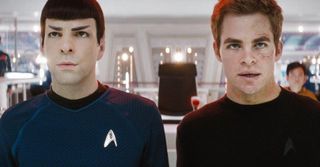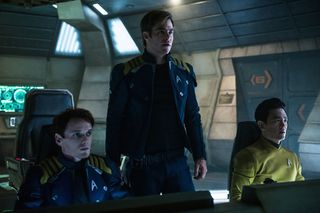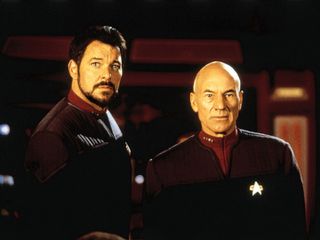Star Trek’s next movie should break from the current reboot — here’s why
The Star Trek reboot had a good run, but now it's time to break away

The Star Trek movie franchise has been in limbo the past few years, ever since Star Trek Beyond underperformed at the box office and ended up losing around $50.5 million. But Paramount has finally kicked things back into gear, by announcing a date for the next installment: June 9, 2023.
It’s unclear whether this movie will be a sequel to Star Trek Beyond, and continue the adventures of the Enterprise crew in the rebooted Kelvin Timeline, or something else entirely. I’m of the opinion that it should be different, but not for the reason you might think.
- How to watch the Star Trek movies in order
- Everything we know about Star Trek: Picard season 2
- Plus: The iPhone's most annoying feature could finally get fixed
I’m not arguing against scrapping the reboot because I don’t like the movies. I quite enjoyed the 2009 Star Trek reboot and Star Trek: Beyond. I didn’t like Into Darkness, and the way it just churned out a half-baked remake of Wrath of Khan. I just feel the Trek movies should go back to its roots, and better connect its big and small screen Treks by bringing TV series back to the big screen.
Rights issues squandered the reboot’s potential
Whether there were ever plans for the rebooted Star Trek to cross over onto TV aren’t known. What we do know is that any hypothetical plans would have been complicated by the fact different people held the rights. When Viacom and CBS split in 2005, CBS held onto Star Treks’ TV rights, while Viacom (and subsidiary Paramount) held onto the movie rights.
For that reason, the Star Trek reboot was always effectively crippled by the cycle of moviemaking. While the three movies didn’t come out on a particularly slow release cycle (2009, 2013, 2016), they didn’t have the advantage of utilizing TV’s super-fast turnaround.
Even if a tie-in TV series didn’t feature the main Enterprise crew as part of its regular cast, it was still something. As Marvel’s Agents of S.H.I.E.L.D. proved years later, it was possible to have a companion TV show tangibly related to a big-screen franchise without much in the way of crossover.
It gives fans something to watch, reminds them that the Star Trek franchise still exists, and helps to market the movie franchise in the process. Plus it could help explore the impact of what happened in the movies beyond the scope of its seven main characters.
Sign up to get the BEST of Tom’s Guide direct to your inbox.
Upgrade your life with a daily dose of the biggest tech news, lifestyle hacks and our curated analysis. Be the first to know about cutting-edge gadgets and the hottest deals.

The planet Vulcan got sucked up by a black hole? Terrible news, but beyond a few scenes featuring Spock’s anger and grief, it’s never really brought up again in the movies. The destruction of a core member of the Federation would have an enormous impact on the galaxy at large.
There was no way to fill in the gaps, not really. Tie-in books and comics existed, but that relies on fans firstly being aware of them, and secondly going out and purchasing them. A TV series could have done much the same thing, but in a way that is much more convenient to the audience. Possibly more entertaining too, depending on your personal views about reading.
Plus Star Trek is, at its core, a TV series that’s about more than just flashy action scenes. The original ten movies understood that, and they still featured plenty of the themes and nuances that Trek had on TV (albeit in a very condensed form).
The reboot didn’t quite understand that, and ended up feeling very much like a Star Wars movie starring Captain Kirk and co. A TV series would have given space for the reboot more of what makes Star Trek Star Trek. More importantly a multi-episode TV season actually has the time to do it, rather than trying to stuff it all into a two-hour run time.
But the whole rights situation killed off any such idea before it could possibly be conceived. Just like it complicated the reboot’s merchandising rights. And with that whole situation, any real hope that the Star Trek reboot could capture the same essence of the TV show was buried.
Filling in the gaps in canon
Future Trek movies should follow the example set by other big franchises, and use an interconnected TV/movie universe to fill in the gaps of the canon.
Take Marvel. We all know that snapping half the universe back into existence was going to have huge ramifications, but Spider-Man: Far From Home kind of glossed over that fact. Which makes sense, since it’s a two hour movie that has its own stuff to get through. Meanwhile Falcon & The Winter Soldier (and to an extent WandaVision) have the time to explore it properly.
Star Wars is another example. In the movies we only ever saw the start and the end of the Clone Wars. But the TV show Clone Wars was able to explore the conflict in huge detail, and focus on things other than the small group of protagonists in the movie. The Mandalorian is doing something similar, exploring a part of the 30-year period between Episodes 6 and 7. And in the process giving us an idea of the state of the galaxy in the years following after the fall of the Empire.
Both those stories also feature in books and comics, but they have the same issue as attempting to do that with Star Trek. A TV series is a much more interesting way to get those stories out to a large audience.
Where Star Trek is concerned, the roles are reversed slightly. It’s a TV series that jumped to the big screen, and not the other way around. But you can still fill in the gaps the TV series leaves behind, much like how the original six movies continued the adventures of the Original Series crew. That means you show people what else is going on in the galaxy while the USS Discovery, or Picard are off saving the universe from evil robots.
Tales of future past
Interestingly there are already plenty of gaps in the Trek canon that the TV series either couldn’t, or weren’t able to address. Especially Enterprise, which was cancelled back in 2005 and left Star Trek off our screens for a good 12 years. More importantly the run-up to the never-made fifth season left behind some unfinished storylines that would be perfectly suited for the big screen.
The big plot point of season 5 would have been humanity’s first (official) contact with the Romulans, and the war that it inevitably led to. A war that changed the political landscape of the Alpha and Beta quadrants until the destruction of Romulus centuries later.
Not only is it a travesty that we’ve never been able to see that pivotal moment of Star Trek history, a full-scale war between Earth and the Romulans is perfectly suited for the big screen. More so when you remember that Earth was not the same force that it became by the days of Kirk and Picard.
There was no Federation, and political alliances between different alien races were tenuous at best. Even with the Vulcans, humanity’s closest extra-terrestrial allies at the time, who also found themselves targets of their distant cousins.

That’s not to say there couldn’t also be stories featuring the cast of other long-finished Star Trek TV shows. Though timeline constraints, and the ongoing Star Trek Picard, mean that there are going to be more restrictions over who can actually appear.
Worf may be one great choice, given the ongoing-popularity of the character and Michael Dorn’s repeated attempts to get producers to agree to give Worf a TV series of his own.
The Picard tie-in novel ‘The Last Best Hope’ revealed that Worf succeeded Picard as captain of the Enterprise-E. Though the details of what the newly-promoted Captain Worf got up to in the 12 years between the novel and Picard’s first season were never revealed. It could be explored in a future season of the TV series, but it’s also the perfect opportunity for new on-screen adventures that are tangibly related to future seasons of Picard.
You have the same Worf, and the same Enterprise (until someone blows it up), which will make it accessible to fans of both Picard and The Next Generation. A whole new crew would also mean you can explore past events without having to worry about the fact actors from previous Trek shows have aged 20 years somehow.
Unless you had a very specific type of alien that could affect actors that way. Like the Krenim from Voyager, who almost exclusively fought with temporal weapons.
Maybe we could see Voyager’s Year of Hell story get a new lease of life? The TV version was pretty underwhelming, and it might benefit from a big screen adaptation with an actual movie budget. I don’t see that actually happening, but it shows there are still things that Star trek movies can explore - even if it means jumping back through the timeline.
Bottom line
Star Trek is uniquely positioned in that its original incarnation persevered past a reboot into the growing TV franchise it is today. Now that the rights to the movies and TV shows belong to the same company, the producers have new opportunities to create something great
Marvel pioneered an interconnected TV and movie universe, more so now that we have the Disney Plus shows. Star Trek is one of the few franchises that can follow that lead. Building on what Paramount did in the late ‘80s and early ‘90s, and resurrecting the idea that Star Trek movies and TV shows can share the same canon.
With little over two years before the next movie’s release, there’s little chance of something new and exciting happening. But there’s always hope that things might go in a different direction. But hey, at the very least, if Paramount is sticking to the reboot I’d also very much like to see that turn up on TV as well. It would be nice if it was greater depth than Discovery’s random alien cameo though.

Tom is the Tom's Guide's UK Phones Editor, tackling the latest smartphone news and vocally expressing his opinions about upcoming features or changes. It's long way from his days as editor of Gizmodo UK, when pretty much everything was on the table. He’s usually found trying to squeeze another giant Lego set onto the shelf, draining very large cups of coffee, or complaining about how terrible his Smart TV is.
